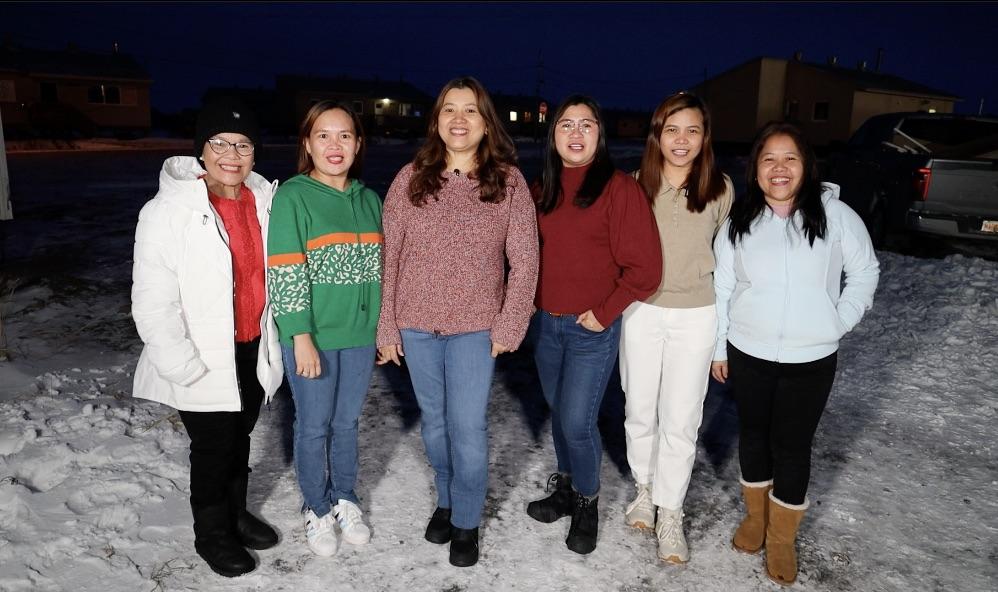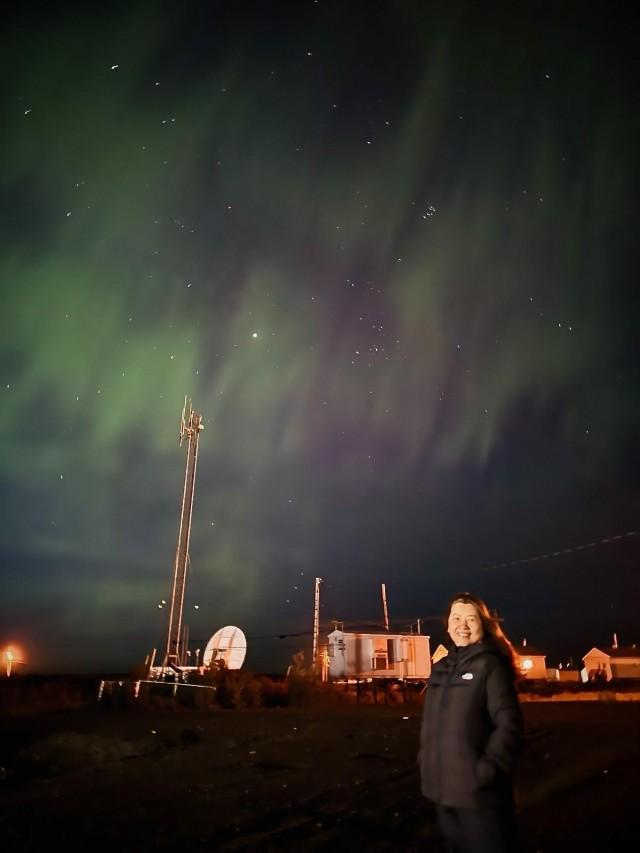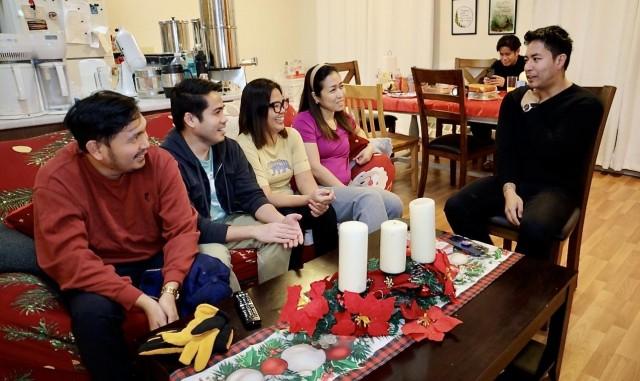Pinoy teachers in remote Alaska village find purpose, reconnect with families this Christmas

NEW YORK CITY — Nearly 300 Filipino teachers are teaching in Alaska, the coldest state in America. Half of these Filipino teachers are assigned to remote areas of Alaska.
One of these places is the village of Stebbins, located 993 miles from Juneau, Alaska's capital. From the Philippines, it takes four to five flights to reach the town of Stebbins.
GMA Integrated News visited several locations in Alaska where Filipino teachers are working.
In the village of Stebbins, 18 teachers are educating the students.
Stebbins is home to over 600 Native Americans of Yup'ik Eskimo descent. There are no malls, restaurants, or bars. The locals mainly engage in commercial and subsistence fishing, gardening, and hunting for leisure and livelihood.
Not everyone in this area celebrates Christmas and New Year.
According to teacher Ethel Sheila Arao, originally from Cagayan de Oro and currently teaching for two years at Tukurngailnguq School in Stebbins, modern technology helps alleviate the sadness of being far from family.
Due to the high cost of travel and the long journey, many teachers choose to celebrate Christmas in the village.
"Those who stay in the village gather during Christmas and New Year's Eve. The feast is extravagant, with all Filipino food. Of course, there's karaoke, and yes, technology is a big help. It eases the longing to be with family during the Holiday season," she shared.
Finding ingredients for traditional Filipino dishes typically served during Christmas is challenging and expensive. For instance, a single onion costs $7, and the ingredients for half a kilo of adobo can amount to $230.
All food supplies, except for seafood, are shipped from the mainland in Anchorage, requiring two flights before reaching the village.
To prepare for Christmas and New Year, they placed their orders three weeks in advance to ensure they could celebrate properly.
Remembering family in PH
Some 171 miles away from Stebbins is the village of Teller, home to about 229 Native Americans. Ten Filipino teachers work at James C. Isabell School in this village.
This village is just 2.5 miles away from Big Diomede Island, a Russian territory across the Bering Strait. The narrow strait separates Russia and Alaska, serving as the only marine gateway between the Arctic Ocean and the Pacific Ocean. During winter, the Bering Strait freezes, allowing people to walk across to Russian territory.

Teacher Gloryann Gregorio said that while teaching in Teller can be lonely, it is also a fulfilling challenge. She added that the salary and support from the school district are significant reasons for staying in Teller.
"Let's not be dishonest. Number one is the salary. The pay in the Philippines isn't enough for one person—it's insufficient. Then the hours you spend in the classroom and at school, it's more than what you're paid for," she said.
Vanissa Serina Carbon, a teacher at Joseph and Olinga Gregory Elementary School in Kalskag Village and originally from Mindanao, shared that cooking Filipino food for Christmas is a luxury due to the difficulty of sourcing supplies.
To cope, they listen to Christmas songs to lift their spirits.
"Mas extra ang lungkot at pagka-miss kasi malayo ka sa pamilya. Patugtog ng mga Filipino Christmas songs, manonood ng Netflix kung meron man, video call sa pamilya sa Pinas tapos luto na ng pagkain salubong sa Pasko o New Year. Suwerte na kung makapagluto ka ng mga pagkaing Pinoy depende kung may naipa-ship kang karne o sangkap o nabili sa Asian store mula sa Anchorage. Kasi wala naman dito sa maliit na store dito sa village. Sa pagkaing handa, ito ang kadalasang handa, Spam, itlog, fried chicken o adobong karne. Special na kung may Pinoy spaghetti ka, lumpia, biko o puto at iba pang handa. Ganu'n pa man, masaya na kami kung maraming handa sa Pinas kaya imagine na lang na ganu'n din handa namin sa mesa namin dito sa village," she said.
(There's extra sadness and longing for home because we're away from our families. We cope by playing Filipino Christmas songs, watching Netflix, video calls with family in the Philippines, then cook food on the eve of Christmas and New Year. We're lucky if we are able to cook Pinoy food, that is if a shipment of meat arrives, or if we're able to buy ingredients from an Asian store in Anchorage. The small stores in the village don't have those. Our feast would usually include Spam, eggs, fried chicken or adobo. Special food items would be Pinoy spaghetti, lumpia, biko, puto or others. Nonetheless, we are happy if our families back home in the Philippines have a lot of food for their own feast. We just image that their feast is our feast as well here in the village.)
"Iniisip na lang po namin na lahat ng sakripisyo na ginagawa namin ay para sa pamilya namin para sa pagkain, gamot, bayad sa hospital at iba pang pangangailangan na hindi ko na kayang maibigay pa kung nasa Pinas ako. Iniisip ko na lang na lilipas din ang mga araw at buwan at makakauwi din kami sa Pinas pagkatapos ng program," she added.
(We just keep in mind that all our sacrifices are for our family. Food, medicines, hospital payments and other needs—I won't be able to provide these if I'm in the Philippines. I just think to myself that the days and months will pass and we will be able to come back home to the Philippines after the program is completed.)

Valued sacrifices
The teachers expressed that they wish they didn't have to leave the Philippines so they could spend Christmas with their families. However, they ask, how could they provide a better life for their loved ones when their salaries back home are insufficient?
The Alaska Department of Labor and Workforce Development Deputy Commissioner, Nelson San Juan, who is also a Filipino, recognizes the sacrifices and contributions of hundreds of Filipino teachers in Alaska. According to San Juan, Filipino teachers possess high-quality skills to educate the Alaskan locals.
"The contributions of the nearly 300 Filipino teachers in Alaska are profoundly significant. These educators bolster the state's already limited teaching workforce, particularly in rural and remote schools where recruitment and retention can be challenging. Their presence ensures continuity of quality education for Alaskan students and helps address the critical teacher shortages in some of the most underserved areas of our state. Without Filipino teachers, it would be very challenging for school districts in Alaska to fill these positions."
Deputy Commissioner San Juan also understands the challenges of being separated from family, a common experience among many Filipino teachers in Alaska. This shared understanding deepens his appreciation for their dedication and resilience.
"As someone who deeply understands the journey and sacrifices of Filipino teachers in Alaska, I can personally say that their resilience is truly inspiring. Being far from home, especially during the holidays, is not easy, but they bring with them the heart of the Filipino culture wherever they go. I've seen how they create moments of joy-gathering with colleagues, singing karaoke, sharing traditional Filipino dishes, and building a sense of family in their communities. In Anchorage, many join Filipino community events, finding warmth and connection among others who share similar experiences. Despite the challenges, their ability to celebrate and uplift each other is a testament to their strength and unwavering optimism. It's not just about adapting—it's about thriving and making Alaska a second home and they always find a was to stay connected with their loved ones, especially during Holidays." — VDV, GMA Integrated News




